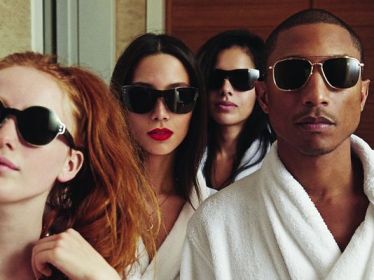A lot of anti-black racism/blackness is steeped in anti-black womanhood. Recently, singer/producer Pharrell Williams annoyed black women/folks with this album cover for his new song:
In the article “Hip Hop’s White Girl Habit” (the link has mysteriously disappeared) the author calls out the marginalizing of black women in music/hip hop
“By no means am I saying that objectifying women sits better with me when it’s Black women as opposed to others. The problem I have is with the perception that white women are an accessory that’s synonymous with luxury and success; that there’s a golden stair lined with pretty women that symbolizes a man’s climb toward the Promised Land where Black women are relegated to the bottom step. Our young people are being told that “just Black” isn’t enough and that idea being associated with hip-hop is bothersome, to say the least.”
Williams has tried to defend himself in the most ridiculous way, but his response is not surprising. The majority of black celebs/rappers today are obsessed with white acceptance. They could give a f*ck about the impact of their actions on black women/the community.
But it goes deeper than just album covers…
A few months ago, a friend gave me a TV. The TV is old as hell, and after just a few days of watching it, only one channel worked I am forced to watch new Jerry Springer type talk shows. It has reminded me why I avoided TV for the past year.
It’s the same old same on these shows, but what has grown worse is the representations of black women. If black women aren’t cussing each other out, they are physically fighting. If they aren’t in a healthy relationship, they are sleeping with friend’s man. The “baby mama” episodes are endless, as well as paternity tests.
It doesn’t matter if it’s her own family members, in relationships with black men or non black men, or even same-sex relationships, black women are portrayed as bothersome folks to deal with.
These images are being put out there to justify the real life oppression of black women.
“According to Collins, stereotypes can serve at least two functions. (A) They can serve to hide or to normalize oppression by making it seem something that the oppressed person wants to do or something that comes from the oppressed person’s nature. (B) They can serve to coerce people into acting in certain ways.” http://web.calstatela.edu/faculty/tbettch/collins.htm
It’s a strange time for black women. On the one hand, folks like Kerry Washington (Scandal), Lupita Nyong’o (12 Years a Slave), are being celebrated. But on other, the majority of black women are being erased, white washed, or horribly stereotyped.
There isn’t even a safe space in the black community/media for the majority of black women. Folks like Tyler Perry, Black Entertainment Television (BET), etc. contribute to anti-black womanhood. It’s a way to keep the black community black male identified/ uphold black male privilege, despite black women being the key/heart of our community.
This anti-black woman hostility is probably why I tend to get piss poor treatment by black folks/non-black folks alike. The majority of folks have nil respect for black women. Sadly, I think it’s going to get worse before it gets better.
I hope you have enjoyed my different topics in celebration of Black History Month. Have a good weekend!


